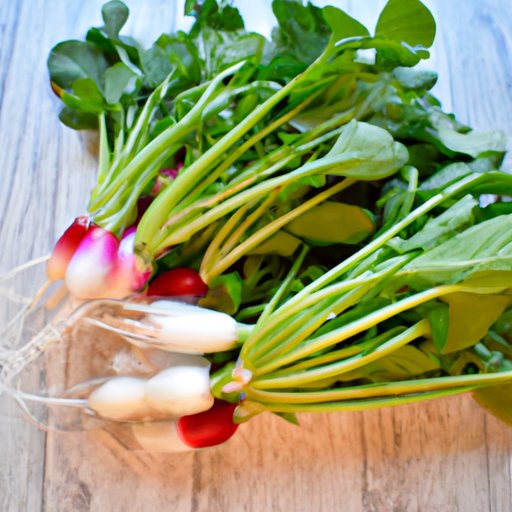
Introduction
Food waste is an increasing problem worldwide, and every time we throw away the greens of radishes, we contribute to it. However, these often-overlooked parts of the vegetable can make a delicious and nutritious addition to your meals. In this article, we’ll explore the benefits of eating radish greens and how to use them in your cooking.
Waste Not, Want Not: How to Eat the Greens of Radishes and Reduce Food Waste
Before we dive into the benefits of radish greens, let’s look at how to properly store and use them to reduce waste in the first place. Once you buy fresh radishes, cut off the tops and store them separately from the roots. Wrap them in a damp paper towel and store in an airtight container in the fridge for up to a week.
When you’re ready to use them, make sure to rinse the greens thoroughly, as they often harbor dirt and debris. You can add them raw to salads and sandwiches or cook them like any other leafy green.
Radish Greens: The Nutritious, Often Overlooked Part of the Vegetable
Radish greens are full of vitamins and minerals, including vitamin C, vitamin K, and folate. They also contain antioxidants that can protect against cancer and heart disease.
Interestingly, radish greens actually contain more nutrients than the roots themselves. While the roots are certainly a good source of vitamin C and fiber, the greens pack in more vitamins and minerals per serving.
From Root to Leaf: Creative Ways to Use Radish Greens in Your Cooking
Radish greens are extremely versatile and can be used in a variety of dishes. Here are a few ideas to get you started:
- Add them to smoothies for an extra nutrient boost
- Sauté them with olive oil and garlic for a simple side dish
- Toss them in pesto for a peppery twist on the classic sauce
- Blend them into soup for a vibrant green color and added nutrition
The Earthy, Peppery Flavors of Radish Greens: A Guide to Incorporating Them in Your Meals
Radish greens have a unique flavor profile that’s earthy and peppery, with a slight bitterness. Because of this, they pair well with other bold flavors. Try combining them with:
- Sour citrus fruits, like grapefruit and lemon
- Salty ingredients, like feta cheese and olives
- Spicy peppers, like jalapeño or serrano
- Sweet fruits, like strawberries and cherries
Revamp Your Salad Game: Top Recipes Featuring Radish Greens
Salads are an easy and delicious way to incorporate radish greens into your diet. Here are a few recipes to try:
Radish Green Salad with Citrus Dressing
- 2 cups radish greens, washed and dried
- 1 grapefruit, segmented
- 1 avocado, diced
- 1/4 cup crumbled feta cheese
- For the dressing: 1/4 cup olive oil, 2 tbsp orange juice, 1 tbsp white wine vinegar, 1 tsp honey, salt and pepper to taste
Combine all ingredients in a large bowl and toss with the dressing. Serve immediately.
Radish Green and Quinoa Salad
- 2 cups radish greens, washed and dried
- 1 cup cooked quinoa
- 1/2 cucumber, diced
- 1/2 red onion, diced
- 1/4 cup fresh mint, chopped
- For the dressing: 1/4 cup olive oil, 2 tbsp lemon juice, 1 tsp honey, salt and pepper to taste
Combine all ingredients in a large bowl and toss with the dressing. Serve chilled.
Eco-Friendly Eating: Why You Should Add Radish Greens to Your Next Meal and Reduce Your Carbon Footprint
Not only are radish greens nutritious, but they also have environmental benefits as well. By using the entire vegetable, including the greens, we reduce food waste and lighten our carbon footprint. Livestock and agriculture contribute to greenhouse gas emissions, but by incorporating more plant-based foods into our diets, we can help reduce them.
Beyond Radish Roots: Exploring the Versatility of Radish Greens in Seasonal Cooking
You can use radish greens in a variety of seasonal dishes. In the spring, try adding them to risottos and pasta dishes for a fresh, herbaceous flavor. In the summer, use them to top bruschetta or pizzas. In the fall and winter, add them to stews and soups for added nutrition.
Conclusion
By using radish greens in your cooking, you can add nutrition and flavor to your meals while reducing food waste and your environmental impact. Whether you add them to salads, smoothies, or soups, don’t let this nutritious part of the vegetable go to waste.




